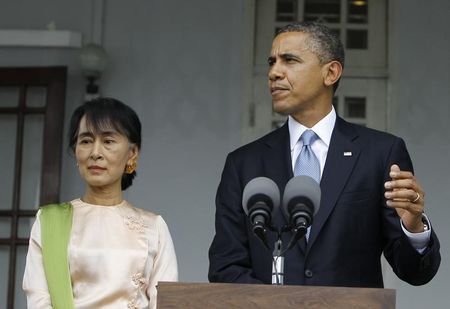By Matt Spetalnick and Jared Ferrie
WASHINGTON/YANGON (Reuters) - Despite hailing Myanmar opposition leader Aung San Suu Kyi as "an icon of democracy," U.S. President Barack Obama is quietly acquiescing to the government's decision to bar her from running for the presidency in next year's election, U.S. officials say.
Obama, who visits Myanmar next week, appears to be balancing his push for democratic reforms with a desire to maintain influence with a government that remains deeply suspicious of Suu Kyi and is led by some of the same former generals who kept her under house arrest for 15 years.
U.S. reluctance to press for assurances that the Nobel Peace Prize winner can contest next year's general election is sure to disappoint her supporters, some of whom spent years in prison until the Southeast Asian country ended 49 years of direct military rule in 2011 and launched reforms.
Whether or not Suu Kyi is allowed to run is "not the standard we're setting" to judge whether the 2015 electoral outcome is credible, a senior U.S. official told Reuters.
Clarification of Washington's hands-off stance on Suu Kyi's political future comes at a time when Myanmar's leaders have been widely accused of backsliding in the transition process.
"What's important is that the people of Burma debate what the future of their democracy is," the senior official said in Washington, referring to Myanmar by its former name.
"We can't prejudice the outcome, nor would we as a modern democracy. We're not going to weigh in and say a certain person should run in the election."
Suu Kyi is ineligible for the presidency because Myanmar's military-drafted constitution bars candidates with a foreign child or spouse. Her late husband was British, as are her two sons. The military's significant presence in parliament gives it veto power on any attempt to change the constitution.
The official said, however, that Obama would press for an election that is "free, fair, open and credible" and seek unspecified constitutional changes. Obama will also press Myanmar's leaders to end persecution of religious minorities including Rohingya Muslims in western Rakhine State, the official said.
"They've made a number of meaningful steps in the reform direction but we're very clear-eyed about the fact that the progress has been uneven and we have significant concerns," said the official, who spoke on condition of anonymity.
After decades of ostracism and economic decline, Myanmar's military leaders moved to shed the country's pariah status in 2011 by lifting restrictions on political opponents, freeing political prisoners and relaxing other rules.
The shift, after years of sanctions and other U.S. pressure, was seen as a rare foreign policy achievement for Obama. But he is now trying to deal pragmatically with the quasi-civilian government amid signs that reforms have stalled and it is failing to curb tensions between majority Buddhists and Muslims.
Those trends, which have taken hold since Obama's 2012 visit, have raised the stakes for his return on Nov. 12-14, when he will attend a regional summit and meet with Myanmar's leaders and 69-year-old democracy champion Suu Kyi.
A backdrop to Washington's decision not to press too hard on behalf of Suu Kyi is China, Myanmar's giant northern neighbor. During its long isolation, Myanmar relied on Beijing as its closest ally, but concern has deepened over China's growing influence over Myanmar's economy, partly prompting the shift to improve ties with Washington.
The risk for U.S. policymakers is that pushing reforms too aggressively could backfire and lead Myanmar back into Beijing's embrace.
NO REWARDS YET
U.S. officials insist Obama will not go easy on President Thein Sein, a former general he once lauded for leading the country's transition. There will be no announcements of further easing of sanctions, no removal of names from the U.S. blacklist and no new military-to–military cooperation, according to Obama aides, reflecting the view that now is not the time for rewards.
The military, whose unelected delegates occupy a quarter of the seats in parliament, has been accused of torture and rape, mainly in areas where ethnic groups have fought for autonomy.
Obama spoke by phone with Thein Sein on Oct. 30, pressing him on constitutional reforms and on the need to do more to end ethnic conflict and address the situation in Rakhine, where Rohingya Muslims live under apartheid-like conditions.
"What we're looking for is clear steps toward devolution of political power from the military, steps toward civilian control," said Colin Willett, Obama's Southeast Asia adviser.
Next year's general election will be the first that Suu Kyi's National League for Democracy (NLD) will contest since it won by a landslide a 1990 vote that followed massive, bloody protests. The result was ignored by the military.
Although some of her popularity has weakened since her release from house arrest in 2010, Suu Kyi would probably win a presidential race if she were allowed to run. Her party spokesman has said Obama should pressure the government to amend the constitution to ensure Suu Kyi can stand in the race.
Senior party members told Reuters in September that if Suu Kyi were barred, the party would enter the polls without a presidential candidate and might even back a former general from the ruling party, which could further divide the opposition.
Suu Kyi continues to have widespread grassroots support as well as international appeal, but cracks have formed in her image at home, with some former supporters saying she has isolated herself from capable advisers.

Obama's challenge will be to lock in existing reforms while prodding the government to do more if it wants normalization of ties with Washington and the full lifting of sanctions which are now just suspended.
(Additional reporting by Paul Mooney in Yangonm and Anna Yukhananov and David Brunnstrom in Washington. Editing by David Storey, Jason Szep and Tomasz Janowski)
